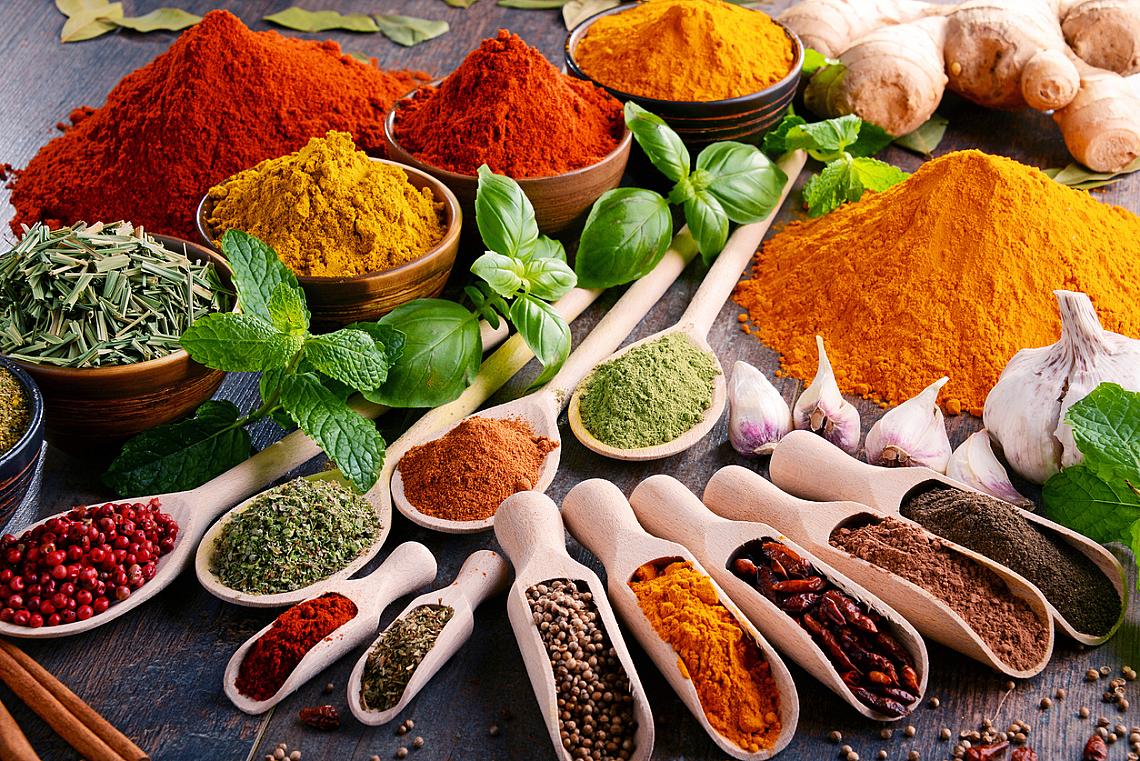Spices and herbs are great for flavoring our food, but did you know they also offer a host of health benefits? For centuries, people have used spices for their medicinal properties, and some of them may even aid in your weight loss efforts! We offer you a list of some of the most useful spices that improve health and support weight loss.
9 spices with numerous health benefits
Losing weight is a process that often requires a combination of proper nutrition, physical activity, and healthy habits. In search of effective methods of maintaining optimal weight, many people turn to natural remedies. Spices, in addition to adding flavor and aroma to food, can play an essential role in the weight loss process. They contain active ingredients that stimulate metabolism, support fat burning and reduce appetite. In this context, we will look at the nine best spices that can be useful in the fight against extra pounds.
1. Ginger
Ginger is a spicy root with a long history of use dating back more than 3,000 years. You may already be familiar with its ability to relieve stomach upsets, but ginger has also been used for a host of other health issues. Ginger root contains antioxidants and chemical compounds that protect the body from germs and harmful bacteria. Although not rich in vitamins or minerals, ginger has significant benefits for immunity and heart health. Studies confirm ginger’s ability to reduce nausea and vomiting, making it especially beneficial for people undergoing chemotherapy or pregnant women who struggle with morning sickness.
2. Cayenne pepper
Cayenne pepper is known for adding a spicy flavor to dishes and is a popular ingredient in exotic cuisine. This hot spice is grown in various places around the world, including India, East Africa, Mexico, and parts of the United States. The active ingredient in peppers, capsaicin, has anti-inflammatory properties that support the health of the heart, digestive system and immune system. Additionally, capsaicin can be used topically to relieve muscle pain. Cayenne pepper is rich in powerful antioxidants such as vitamins A, C, E, beta-carotene, lutein and cryptoxanthin, as well as important vitamins and minerals such as vitamins B6, B2, folate, iron, zinc and manganese. The spicy taste of chili peppers heats up the body, which can speed up metabolism and help burn more calories. One study shows that adding chili pepper to food increases satiety and reduces cravings for fatty or sugary foods.
Cayenne pepper is often used in Creole and Mexican cuisine. You can add it to meat, fish, rice, beans, curry or eggs. This seasoning is also suitable for marinades or salad dressings.
3. Cinnamon
Cinnamon is an aromatic spice that originates from the Caribbean, South America and Southeast Asia. In the past it was used both as a medicinal herb for respiratory and digestive problems and as a perfume. Phytochemicals, including cinnamic aldehyde, give cinnamon its sweet aroma and flavor and are linked to its potential health benefits. Some research shows that cinnamon’s antioxidant, antimicrobial, and anti-inflammatory properties can help the body fight infection, reduce the risk of certain diseases, and support the immune system and brain health.
4. Cumin
Cumin is a powerful and versatile spice widely used in Latin American, Spanish, African and Indian cuisines. It has been used in both cooking and medicine for centuries, especially in India where it is grown. It is used to treat various conditions such as kidney and bladder stones, eye diseases, indigestion and diarrhea. Modern research shows that cumin’s anti-inflammatory and antioxidant properties, including flavonoids, alkaloids and phenols, may contribute to maintaining good health. In addition, cumin seeds are a rich source of iron, manganese, magnesium, calcium, phosphorus, vitamins A, C, E, K, vitamin B6 and others. Some studies suggest that cumin can support healthy weight loss, making it an ideal spice to add flavor to your meals.
5. Black cumin seed oil
Although black cumin and common cumin come from the same genus of plant, black cumin seeds have a stronger and more bitter taste, making them less popular in American cuisine. However, this spice offers significant health benefits. This spice has a long history of use for its medicinal properties in southern and eastern Europe, the Middle East, and southwest Asia. These benefits are due to the active antioxidant and anti-inflammatory compounds in black seeds, including thymoquinone. Health benefits include reducing inflammation, supporting healthy digestion, and potentially reducing the risk of heart disease. Black cumin is a rich source of protein, fiber and various vitamins and minerals, including calcium, iron, zinc , folate and phosphorus.
6. Black pepper
You may not know, but one of the most commonly used spices in the kitchen has significant health benefits! Black pepper has been shown to be beneficial for soothing the stomach and aiding digestion. There is evidence that it can help you feel fuller after a meal by improving the absorption of important nutrients. This is mainly due to piperine, the active ingredient in black pepper, which aids in the absorption of antioxidants such as curcumin and resveratrol. Curcumin, contained in turmeric, is a powerful anti-inflammatory and antioxidant agent. Resveratrol, in turn, contributes to brain and heart health. Curcumin and resveratrol are difficult to absorb on their own, so black pepper in your food can aid their absorption, unlocking their healthful properties. This is another reason to add pepper to your dishes!
7. Mustard seed
Mustard seed is an excellent spice worth including in your diet. It comes from the mustard plant and is a relative of broccoli, Brussels sprouts and cabbage. This seed is mentioned in ancient Sanskrit scriptures from about 5000 years ago and in the New Testament. Mustard seed’s long history of use is due to its many potential antioxidant and anti-inflammatory benefits. It is a rich source of phytonutrients called glucosinolates (which give mustard its characteristic taste), as well as omega-3 fatty acids, selenium, manganese, phosphorus, copper and zinc. This combination makes it important for maintaining overall health. Mustard seed is also the main ingredient of our favorite mustard. However, many of the regular mustard sauces are highly processed and contain added sugars. So it’s a good idea to check labels to avoid unnecessary additives.
8. Turmeric
Turmeric is a spice and medicinal herb used in India for thousands of years. Its active ingredient, curcumin, is known for its antioxidant and anti-inflammatory properties. Chronic inflammation plays a role in most diseases, making turmeric valuable for the potential prevention and treatment of these conditions. Turmeric can also help support the immune system by increasing beneficial gut bacteria. This spice acts as an adaptogen, powerful antioxidant and prebiotic for the gut.
9. Cardamom
Cardamom, like cinnamon, has a floral and sweet flavor that is very versatile. This spice is rich in antioxidants and has powerful anti-inflammatory properties. It can help fight free radicals, reduce inflammation in the body, and protect against high cholesterol, high blood pressure, and some digestive problems. In addition, cardamom supports healthy weight loss. Studies show that consumption of cardamom powder is associated with significant weight loss and cholesterol reduction. Another study in overweight or obese women found that taking cardamom reduced levels of inflammatory proteins, which may help reduce the risk of various health problems.
Cardamom also contains small amounts of fiber, key fatty acids, as well as vitamins and minerals such as potassium, calcium, phosphorus and magnesium. Because of these qualities, it is often called the “queen of spices”. If you haven’t already incorporated cardamom into your kitchen, now is the perfect time to do so.
Sources:
- https://www.cnn.com/2017/08/24/health/cinnamon-health-benefits/index.html
- https://www.ncbi.nlm.nih.gov/pmc/articles/PMC4466762/
- https://www.ncbi.nlm.nih.gov/pmc/articles/PMC5896244/
- https://www.webmd.com/diet/health-benefits-cumin#1
- https://www.organicfacts.net/health-benefits/seed-and-nut/health-benefits-of-cumin.html
- https://www.ncbi.nlm.nih.gov/pmc/articles/PMC5557534/pdf/12944_2017_Article_539.pdf
- https://www.webmd.com/diet/black-seed-health-benefits#1
- https://www.ncbi.nlm.nih.gov/pmc/articles/PMC6535880/
- https://www.cookinglight.com/cooking-101/resources/what-is-black-seed-oil
- https://time.com/5503520/black-pepper-health-benefits/


